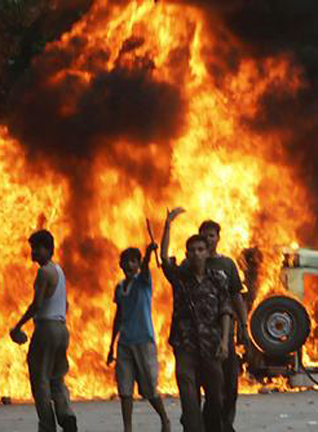1984
India's Incomplete Democracy
RAHULDEEP SINGH GILL
In April and May, the world's largest 'democracy' elected its latest prime minister, Narendra Modi.
Modi has promised to shake up long-standing government corruption and bring prosperity to all of India, as he claims he did to the state of Gujarat as its chief minister.
But it wasn't just a desire for economic reform that helped seal Modi's victory: He is the leader of the zealous Bharatiya Janata Party, and he was ushered into office by a surge of Hindu fundamentalism and religious fervor.
Moreover, his effectiveness as a uniting figure for India is called into question by his inaction in Gujarat in 2002, when he did nothing to stop thousands of Muslims from being massacred or made homeless by mobs.
With the ascension of Modi and the BJP come inevitable concerns about India's willingness to treat all of its citizens equally. And it is not just a problem between the nation's Hindu majority and Muslims, who make up nearly 15% of the population.
Another massacre of an Indian religious minority also looms in the national collective memory.
Thirty years ago this month, the Indian army went on a murderous rampage through the holiest of Sikh sacred spaces, the Darbar Sahib, known to visitors to India as the Golden Temple, in Amritsar, Punjab.
"Operation Blue Star," as the generals called the invasion, is for Sikhs an event on a level with the Roman army sacking the temple at Jerusalem.
The Indian state, under the leadership of the Congress Party and Prime Minister Indira Gandhi, ostensibly ordered the operation to dislodge Sikh militants occupying the sacred compound. Documents recently released in Britain have forced the British government to confirm its advisory role in planning such an attack several months before the invasion.
The Indian government has always disputed the number of people killed, but according to Ensaaf, a nonprofit organization working to end impunity in Indian state crimes, no fewer than 4,000 innocent pilgrims died -- men, women & children -- on top of hundreds of militants and army personnel.
This was not the end of it. In what was seen as an act of payback, Gandhi was assassinated by her two Sikh bodyguards.
Anti-Sikh pogroms, which followed this assassination in the fall of 1984, saw Sikhs raped and killed throughout India's urban centers.
The Amritsar massacre also touched off a "decade of disappearances" in which the Indian government waged more counterinsurgency efforts in the state of Punjab. Several more thousands of Sikhs were tortured, killed and disappeared through brutal police crackdowns.
The Sikh community was founded when Guru Nanak received what Sikhs believe to be a series of original divine revelations that gave rise to their scripture. Sikhs are a distinct community in the diverse milieu of India religions, but they have enough in common with Christians, Hindus and Muslims that there is no reason there cannot be peace among them.
Human rights organizations continue to press for the killers of Sikhs to be prosecuted, but many of the guilty now serve as leaders of the Congress Party in the halls of the Indian Parliament. Justice continues to be thwarted as the architects of Operation Blue Star, anti-Sikh pogroms and the brutal wave of counterinsurgency remain free.
The larger issue, which goes beyond individual accountability, is just as important. Mark Twain called India "the cradle of the human race, the birthplace of human speech, the mother of history." India's promise is that the world's largest democracy can somehow bring together a billion people who speak 300 languages and worship a multitude of deities, or none at all.
But the Indian state struggles to accommodate religious minorities. The historic massacres of Muslims and Sikhs have their contemporary parallels in the tribulations of the Kashmiri people and the suffering of indigenous people in eastern India.
Indian partisans, including Modi supporters, will certainly take this opportunity to remind us that it was the secular Congress Party that was responsible for the 1984 invasion of the Darbar Sahib complex, not the BJP. But the willingness to forget state-sponsored violence has no partisan contours.
Oppression of minorities is still an untreated disease in the national bloodstream, and we must ask whether state-sponsored violence is necessarily a thing of the past.
Modi's election message was all about moving India up to higher echelons of financial achievement.
Yet India still lacks a government that has the credibility to build a lasting legacy of democratic pluralism.
The author teaches courses on the Sikh Religion and faiths of South Asia at California Lutheran University, where he is an Assistant Professor of Religion and directs the Center for Equality and Justice.
[Courtesy: Los Angeles Times. Edited for sikhchic.com]
June 19, 2014
Conversation about this article
1: Kaala Singh (Punjab), June 19, 2014, 5:30 PM.
The greatest trait of a democracy is the rule of law. India is a lawless jungle where the bigger beast is always ready to feast on the smaller one. The future of minorities in India will depend on their ability to defend themselves and not on the State whose undeclared policy is to suppress the minorities.
2: Baldev Singh (Bradford, United Kingdom), June 20, 2014, 5:18 PM.
Sikhs have the ability to withstand any onslaught, even by a billion Hindu bullies!



